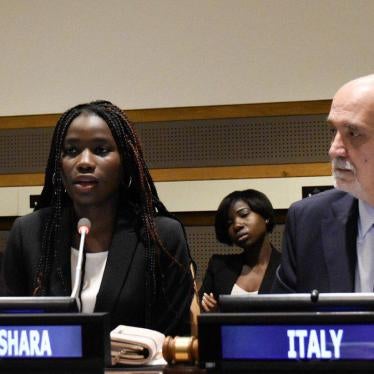This submission relates to Articles 28 and 38 of the Convention on the Rights of the Child, and focuses on the protection of students, teachers, and schools during armed conflict.
In June 2015, then foreign minister of Guatemala, Carlos Raul Morales, told the United Nations Security Council:
“We must put an end to the military use of schools by armed groups. Initiatives such as the Lucens Guidelines can help to prevent the military use of schools and universities, as they call on both State and non-State actors to immediately cease their attacks and threats against schools and to refrain from actions that hinder children’s access to education. Along these lines, we welcome the adoption of the Safe Schools Declaration, on 29 May, in Oslo, Norway.”
The Safe Schools Declaration is an inter-governmental political commitment that provides countries the opportunity to express political support for the protection of students, teachers, and schools during times of armed conflict; the importance of the continuation of education during armed conflict; and the implementation of the Guidelines for Protecting Schools and Universities from Military Use during Armed Conflict (previously known as the Lucens Guidelines). As of October 2017, 70 countries have endorsed the Safe Schools Declaration, including nine Latin American countries, but not Guatemala.
At the same June 2015 Security Council meeting, the Council unanimously adopted resolution 2225 (2015) on children and armed conflict, which:
Expresses deep concern that the military use of schools in contravention of applicable international law may render schools legitimate targets of attack, thus endangering the safety of children and in this regard encourages Member States to take concrete measures to deter such use of schools by armed forces and armed groups.[1]
As of August 2017, Guatemala was contributing 162 troops and 21 military experts to UN peacekeeping operations around the world. Such troops are required to comply with the United Nations Department of Peacekeeping Operations’ UN Infantry Battalion Manual (2012), which includes the provision that “schools shall not be used by the military in their operations.”[2]
Guatemala’s peacekeeping troops are deployed in the Democratic Republic of Congo, which has endorsed the Safe Schools Declaration, and, as this Committee noted in 2017, has itself prohibited the occupation of schools by the military.[3]
The 2017 Child Protection Policy of the United Nations Department of Peacekeeping Operations, Department of Field Support, and Department of Political Affairs also notes:
United Nations peace operations should refrain from all actions that impede children's access to education, including the use of school premises. This applies particularly to uniformed personnel. Furthermore, recognizing the adverse impact of the use of schools for military purposes, in particular its effects on the safety of children and education personnel, the civilian nature of schools, and the right to education, United Nations peace operations personnel shall at no time and for no amount of time use schools for military purposes.[4]
Human Rights Watch recommends to the Committee that it ask the government of Guatemala:
- What steps has Guatemala taken in line with UN Security Council Resolution 2143 (2014) and 2225 (2015) to deter the use of schools for military purposes?
- Are protections for schools from military use included in any policies, rules, or pre-deployment trainings for Guatemala’s armed forces?
Human Rights Watch asks the Committee to:
- Congratulate Guatemala for attending the Buenos Aires Safe Schools Conference in March 2017.
- Call upon the government of Guatemala to endorse the Safe Schools Declaration, and take concrete measures to deter the military use of schools, including by bringing the Guidelines for Protecting Schools and Universities from Military Use during Armed Conflict into domestic military policy and operational frameworks.
[1] United Nations Security Council, Resolution 2225 (2015), S/RES/2225 (2015), para 7.
[2] United Nations Infantry Battalion Manual, 2012, section 2.13, “Schools shall not be used by the military in their operations.”
[3] Committee on the Rights of the Child, Concluding observations on the combined third to fifth periodic report of the Democratic Republic of Congo, CRC/C/COD/CO/3-5, February 28, 2017, paras. 39-40.
[4] United Nations Department of Peacekeeping Operations, Department of Field Support and Department of Political Affairs, “Child Protection in UN Peace Operations (Policy),” June 2017.







